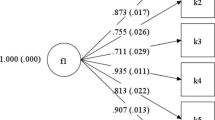Abstract
Among the most pressing considerations in psychological injury litigation is potential overreporting of symptoms or impairments by the plaintiff. It is thus imperative for psychological injury evaluators to possess a working understanding of the conceptual and empirical foundations of symptom validity tests (SVTs). This literature review first covers foundational knowledge to guide evaluators in the careful interpretation of SVTs. It then focuses on two of the most well-established SVTs, i.e., the Minnesota Multiphasic Personality Inventory-2-Restructured Form (MMPI-2-RF) and the Personality Assessment Inventory (PAI). Each instrument is reviewed for its overreporting scales, including scale development strategies, standard cutoff values, and research support, with particular attention afforded to psychological injury litigation considerations. Findings from this narrative review suggest that both the MMPI-2-RF and the PAI are sound SVTs with growing bodies of empirical support. However, they must be interpreted with special caution in the unique context of psychological injury evaluations, where there runs a greater risk of false-positive identification of overreporting. The strengths of each measure are contrasted, revealing general themes. Notably, the MMPI-2-RF excels in its accumulation of research support and civil litigant-specific norms, whereas the PAI leads SVT research in innovation and advanced detection techniques. Both measures are better equipped to detect feigned psychopathology than cognitive or medical impairments. Recommendations for forensic evaluators and areas for future research are presented accordingly.
Similar content being viewed by others
References
Aguerrevere, L. E., Calamia, M. R., Greve, K. W., Bianchini, K. J., Curtis, K. L., & Ramirez, V. (2018). Clusters of financially incentivized chronic pain patients using the Minnesota Multiphasic Personality Inventory-2 Restructured Form (MMPI-2-RF). Psychological Assessment, 30(5), 634–644. https://doi.org/10.1037/pas0000509.
Arbisi, P. A. (2017). Form vs function, fighting the last war: a reflection on the exchange between Larrabee, Bianchini, Boone, and Rohling (2017) and Nichols (2017) over Nichols and Gass (2015). The Fake Bad Scale (FBS): Malingering or ligation response syndrome—which is it? The Clinical Neuropsychologist, 31(8), 1406–1411. https://doi.org/10.1080/13854046.2017.1365933.
Archer, R. P., Buffington-Vollum, J. K., Stredny, R. V., & Handel, R. W. (2006). A survey of psychological test use patterns among forensic psychologists. Journal of Personality Assessment, 87(1), 84–94. https://doi.org/10.1207/s15327752jpa8701_07.
Ben-Porath, Y. S., & Tellegen, A. (2011). MMPI-2-RF (Minnesota Multiphasic Personality Inventory-2 Restructured Form): Manual for administration, scoring, and interpretation (rev. ed.). Minneapolis: University of Minnesota Press (Original manual published in 2008).
Bianchini, K. J., Aguerrevere, L. E., Curtis, K. L., Roebuck-Spencer, T. M., Frey, F. C., Greve, K. W., & Calamia, M. (2018). Classification accuracy of the Minnesota Multiphasic Personality Inventory-2 (MMPI-2)-Restructured form validity scales in detecting malingered pain-related disability. Psychological Assessment, 30(7), 857–869. https://doi.org/10.1037/pas0000532.
Bianchini, K. J., Greve, K. W., & Glynn, G. (2005). On the diagnosis of malingered pain-related disability: Lessons from cognitive malingering research. The Spine Journal, 5(4), 404–417. https://doi.org/10.1016/j.spinee.2004.11.016.
Boccaccini, M. T., & Brodsky, S. L. (1999). Diagnostic test usage by forensic psychologists in emotional injury cases. Professional Psychology: Research and Practice, 30(3), 253–259. https://doi.org/10.1037/0735-7028.30.3.253.
Boccaccini, M. T., & Hart, J. R. (2018). Response style on the Personality Assessment Inventory and other multiscale inventories. In R. Rogers & S. D. Bender (Eds.), Clinical assessment of malingering and deception (4th ed., pp. 280–300). New York: Guilford Press.
Briere, J. (2001). Detailed Assessment of Posttraumatic Stress: DAPS: Professional manual. Lutz: Psychological Assessment Resources.
Butcher, J. N., Dahlstrom, W. G., Graham, J. R., Tellegen, A., & Kaemmer, B. (1989). MMPI-2 (Minnesota Multiphasic Personality Inventory-2): Manual for administration, scoring, and interpretation. Minneapolis: University of Minnesota Press.
Correa, A. A. (2018). Beyond borders: Cultural and transnational perspectives of feigning and other response styles. In R. Rogers & S. D. Bender (Eds.), Clinical assessment of malingering and deception (4th ed., pp. 61–80). New York: Guilford Press.
Correa, A. A., Rogers, R., & Williams, M. M. (2018). Malingering and defensiveness on the Spanish Personality Assessment Inventory: An initial investigation with mostly Spanish-speaking outpatients. Assessment. Advance online publication. https://doi.org/10.1177/1073191118778895.
Crighton, A. H., Tarescavage, A. M., Gervais, R. O., & Ben-Porath, Y. S. (2017). The generalizability of overreporting across self-report measures: An investigation with the Minnesota Multiphasic Personality Inventory–2–Restructured Form and the Personality Assessment Inventory in a civil disability sample. Assessment, 24(5), 555–574. https://doi.org/10.1177/1073191115621791.
Daubert v. Merrell Dow Pharmaceuticals. (1993). 509 U.S. 579.
Frederick, R. I., & Crosby, R. D. (2000). Development and validation of the Validity Indicator Profile. Law and Human Behavior, 24(1), 59–82. https://doi.org/10.1023/A:1005426803586.
Gaasedelen, O. J., Whiteside, D. M., Altmaier, E., Welch, C., & Basso, M. R. (2019). The construction and the initial validation of the Cognitive Bias Scale for the Personality Assessment Inventory. The Clinical Neuropsychologist, 33(8), 1467–1484. https://doi.org/10.1080/13854046.2019.1612947.
Gaasedelen, O. J., Whiteside, D. M., & Basso, M. (2017). Exploring the sensitivity of the Personality Assessment Inventory symptom validity tests in detecting response bias in a mixed neuropsychological outpatient sample. The Clinical Neuropsychologist, 31(5), 844–856. https://doi.org/10.1080/13854046.2017.1312700.
Gaines, M. V., Giles, C. L., & Morgan, R. D. (2012). The detection of feigning using multiple PAI scale elevations: A new index. Assessment, 20(4), 437–447. https://doi.org/10.1177/1073191112458146.
Gervais, R. O., Ben-Porath, Y. S., Wygant, D. B., & Sellbom, M. (2010). Incremental validity of the MMPI-2-RF over-reporting scales and RBS in assessing the veracity of memory complaints. Archives of Clinical Neuropsychology, 25(4), 274–284. https://doi.org/10.1093/arclin/acq018.
Green, P., Allen, L., & Astner, K. (1996). Manual for Computerized Word Memory Test. Duran, NC: CogniSyst.
Hathaway, S. R., & McKinley, J. C. (1943). The Minnesota Multiphasic Personality Inventory manual. New York, NY: Psychological Corporation.
Hawes, S. W., & Boccaccini, M. T. (2009). Detection of overreporting of psychopathology on the Personality Assessment Inventory: A meta-analytic review. Psychological Assessment, 21(1), 112–124. https://doi.org/10.1037/a0015036.
Hong, S. H., & Kim, Y. H. (2001). Detection of random response and impression management in the PAI: II. Detection indices. Korean Journal of Clinical Psychology, 20, 751–761.
Ingram, P. B., Golden, B. L., & Armistead-Jehle, P. J. (2020). Evaluating the Minnesota Multiphasic Personality Inventory-2-Restructured Form (MMPI-2-RF) over-reporting scales in a military neuropsychology clinic. Journal of Clinical and Experimental Neuropsychology, 42(3), 263–273. https://doi.org/10.1080/13803395.2019.1708271.
Ingram, P. B., & Ternes, M. S. (2016). The detection of content-based invalid responding: A meta-analysis of the MMPI-2-Restructured Form’s (MMPI-2-RF) over-reporting validity scales. The Clinical Neuropsychologist, 30(4), 473–496. https://doi.org/10.1080/13854046.2016.1187769.
Larrabee, G. J., Bianchini, K. J., Boone, K. B., & Rohling, M. L. (2017a). The MMPI-2/MMPI-2-RF Symptom Validity Scale (FBS/FBS-r) is not a measure of ‘litigation response syndrome’: Commentary on Nichols and Gass (2015). The Clinical Neuropsychologist, 31(8), 1387–1395. https://doi.org/10.1080/13854046.2017.1364423.
Larrabee, G. J., Bianchini, K. J., Boone, K. B., & Rohling, M. L. (2017b). The validity of the MMPI-2/MMPI-2-RF Symptom Validity Scale (FBS/FBS-r) is established: Reply to Nichols (2017). The Clinical Neuropsychologist, 31(8), 1401–1405. https://doi.org/10.1080/13854046.2017.1363293.
Malm, S. P., Pierson, E. E., Finch, W. H., Spengler, P. M., Johnson, J., & Morey, L. C. (2019). Detecting feigning in adolescents on the Personality Assessment Inventory—Adolescent form. Journal of Personality Assessment. Advance online publication, 102, 751–757. https://doi.org/10.1080/00223891.2019.1693389.
Mazza, C., Orrù, G., Burla, F., Monaro, M., Ferracuti, S., Colasanti, M., & Roma, P. (2019). Indicators to distinguish symptom accentuators from symptom producers in individuals with a diagnosed adjustment disorder: A pilot study on inconsistency subtypes using SIMS and MMPI-2-RF. PLoS One, 14(12), 1–15. https://doi.org/10.1371/journal.pone.0227113.
McCredie, M. N., & Morey, L. C. (2018). Evaluating new supplemental indicators for the Personality Assessment Inventory: Standardization and cross-validation. Psychological Assessment, 30(10), 1292–1299. https://doi.org/10.1037/pas0000574.
Meyer, J. K., Hong, S. H., & Morey, L. C. (2015). Evaluating the validity indices of the Personality Assessment Inventory–Adolescent version. Assessment, 22(4), 490–496. https://doi.org/10.1177/1073191114550478.
Mogge, N. L., Lepage, J. S., Bell, T., & Ragatz, L. (2010). The negative distortion scale: A new PAI validity scale. Journal of Forensic Psychiatry and Psychology, 21(1), 77–90. https://doi.org/10.1080/14789940903174253.
Mooney, S. R., Stafford, J., & Seats, E. (2018). Medical evaluation board involvement, non-credible cognitive testing, and emotional response bias in concussed service members. Military Medicine, 183(11–12), e546–e554. https://doi.org/10.1093/milmed/usy038.
Morey, L. C. (2007a). Personality Assessment Inventory: Professional manual (2nd ed.). Lutz: Psychological Assessment Resources (Original manual published in 1991).
Morey, L. C. (2007b). Personality Assessment Inventory—Adolescent: Professional manual. Lutz: Psychological Assessment Resources.
Nichols, D. S. (2017). Fake bad scale: The case of the missing construct, a response to Larrabee, Bianchini, Boone, and Rohling (2017). The Clinical Neuropsychologist, 31(8), 1396–1400. https://doi.org/10.1080/13854046.2017.1365934.
Nichols, D. S., & Gass, C. S. (2015). The Fake Bad Scale: Malingering or litigation response syndrome—Which is it? Archives of Assessment Psychology, 5(1), 5–10.
Olsen, A. M., & Veltri, C. O. (2019). The moderating influence of disorder on coached overreporting using the MMPI-2-RF. Journal of Personality Assessment, 101(3), 264–273. https://doi.org/10.1080/00223891.2018.1472099.
Rogers, R. (2018a). An introduction to response styles. In R. Rogers & S. D. Bender (Eds.), Clinical assessment of malingering and deception (4th ed., pp. 3–17). New York: Guilford Press.
Rogers, R. (2018b). Detection strategies for malingering and defensiveness. In R. Rogers & S. D. Bender (Eds.), Clinical assessment of malingering and deception (4th ed., pp. 18–41). New York: Guilford Press.
Rogers, R., Sewell, K. W., & Gillard, N. D. (2010). SIRS-2: Structured interview of reported symptoms, 2nd edition: Professional manual. Lutz: Psychological Assessment Resources.
Rogers, R., Sewell, K. W., Morey, L. C., & Ulstad, K. L. (1996). Detection of feigned mental disorders on the personality assessment inventory: A discriminant analysis. Journal of Personality Assessment, 67(3), 629–640. https://doi.org/10.1207/s15327752jpa6703_15.
Russell, D. N., & Morey, L. C. (2019). Use of validity indicators on the Personality Assessment Inventory to detect feigning of post-traumatic stress disorder. Psychological Injury and Law, 12(3–4), 204–211. https://doi.org/10.1007/s12207-019-09349-7.
Sharf, A. J., Rogers, R., Williams, M. M., & Henry, S. A. (2017). The effectiveness of the MMPI-2-RF in detecting feigned mental disorders and cognitive deficits: A meta-analysis. Journal of Psychopathology and Behavioral Assessment, 39(3), 441–455. https://doi.org/10.1007/s10862-017-9590-1.
Sleep, C. E., Petty, J. A., & Wygant, D. B. (2015). Framing the results: Assessment of response bias through select self-report measures in psychological injury evaluations. Psychological Injury and Law, 8(1), 27–39. https://doi.org/10.1007/s12207-015-9219-1.
Tombaugh, T. N. (1996). Test of memory malingering: TOMM. North Tonawanda: Multi-Health Systems.
Whiteside, D. M., Hunt, I., Choate, A., Caraher, K., & Basso, M. R. (2020). Stratified performance on the Test of Memory Malingering (TOMM) is associated with differential responding on the Personality Assessment Inventory (PAI). Journal of Clinical and Experimental Neuropsychology, 42(2), 131–141. https://doi.org/10.1080/13803395.2019.1695749.
Wygant, D. B., Walls, B. D., Brothers, S. L., & Berry, D. T. (2018). Assessment of malingering and defensiveness on the MMPI-2 and MMPI-2-RF. In R. Rogers & S. D. Bender (Eds.), Clinical assessment of malingering and deception (4th ed., pp. 257–279). New York: Guilford Press.
Young, G. (2015). Malingering in forensic disability-related assessments: Prevalence 15±15%. Psychological Injury and Law, 8(3), 188–199. https://doi.org/10.1007/s12207-015-9232-4.
Young, G. (2019). The cry for help in psychological injury and law: Concepts and review. Psychological Injury and Law, 12(3–4), 225–237. https://doi.org/10.1007/s12207-019-09360-y.
Yoxall, J., Bahr, M., & O’Neill, T. (2017). Faking bad in workers compensation psychological assessments: Elevation rates of negative distortion scales on the Personality Assessment Inventory in an Australian sample. Psychiatry, Psychology and Law, 24(5), 682–693. https://doi.org/10.1080/13218719.2017.1291295.
Author information
Authors and Affiliations
Corresponding author
Ethics declarations
Conflict of Interest
The authors declare that they have no conflicts of interest.
Additional information
Publisher’s Note
Springer Nature remains neutral with regard to jurisdictional claims in published maps and institutional affiliations.
Rights and permissions
About this article
Cite this article
Fokas, K.F., Brovko, J.M. Assessing Symptom Validity in Psychological Injury Evaluations Using the MMPI-2-RF and the PAI: an Updated Review. Psychol. Inj. and Law 13, 370–382 (2020). https://doi.org/10.1007/s12207-020-09393-8
Received:
Accepted:
Published:
Issue Date:
DOI: https://doi.org/10.1007/s12207-020-09393-8




